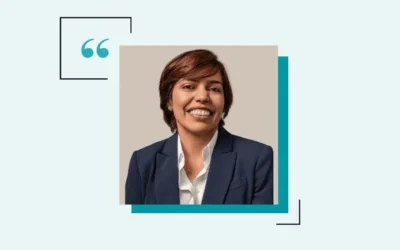As a longtime finance leader in tech, Tim Ritters has had a front row seat to some of the biggest technological disruptions of the last two decades.
An accountant by training, he worked in Google’s finance department in the early aughts, when the company was still finding its footing in search. It grew massively during his decade there. “We were at about 1,700 people when I joined, and we grew to about 60,000 people by the time I left,” Ritters recalls.
After Google, Ritters took on his first CFO job at California-based data storage firm Pure Storage. During his five years there, he helped steer the company’s IPO after only 14 months on the job.
These days, Ritters is spending his time as finance chief of Bay Area business intelligence startup Gong, which sells AI tools designed to help sales teams boost revenue. Founded in 2015, the company has been working in the artificial intelligence realm long before the current boom in large language models like ChatGPT. Ritters notes that Gong has gone on to land over 4,500 customers, including five of the Fortune 10 companies.
In an interview with CFO.com, Ritters talks through the cyclical nature of tech innovations, what he gained working as a public accountant, and lessons learned from taking a company public.

CFO, Gong
First CFO position: August 2019
Notable previous employers:
- Deloitte
- Siebel Systems
- Pure Storage
This conversation has been edited for brevity and clarity.
DAN NIEPOW: You earned your undergraduate degree in accounting. Would you still get an accounting degree today?
TIM RITTERS: I would. I learned so much as a public auditor in those two and a half years out of college. I got a chance to see how dozens of different companies operate. It was just a diversity of experience that I don’t think I would have gotten anywhere else. It’s made me who I am. It was invaluable.
You got your start in finance as an auditor with Deloitte in the ‘90s. What were some lessons you learned working for a Big Four firm?
There’s that sheer diversity of exposure I just mentioned, but the role also gave me managerial responsibilities very quickly. That people management aspect is something unique you wouldn’t typically get in other organizations that quickly. I got a lot of powerful training early on in my career. Plus, after my time as a consultant at Deloitte, I went on to become a consultant there. That’s where I started thinking about how we can use technology to solve problems, and it’s one of the reasons I’m still in tech today.
You spent a decade at Google in the 2000s, during a period of massive changes in the way we interact with the internet and technology. How does the current era of technological advancements compare?
Well, there are similarities and differences. In terms of similarities, we go through a cycle like this almost every decade. There was the search cycle. There was the mobile cycle. There was the social cycle, which gave rise the companies like Facebook. Over the last 50 years, we tend to have these regular cycles, and I think we’re in another one of them now.
As for differences, what stands out is the pace at which we’re moving now. With every cycle, it feels like the pace of innovation just gets faster and faster. That’s been fascinating to watch. Now, it seems that not a week goes by without something really interesting happening in AI.
Gong was working in the AI realm before the wide-scale rollout of large language models. How has your business changed since it was founded in 2015?
Lots of people have asked us about the impact of OpenAI and ChatGPT. Many have wondered whether it’s been a headwind for our business. In reality, it’s actually been a bit of a tailwind for us. For one, we don’t have to do all our own work in large language models. We can do this targeted LLM work instead of the core plumbing work. The amount of savings we can get by using other LLMs is quite large. We can go do different things and do it cheaper.
The mainstreaming of AI tools has been a benefit for us, too. In the pre-OpenAI days, we’d talk to potential customers about how they could use AI tools to get their sales reps to sell more. At the time, some people thought it was the stuff of science fiction. But, with the advent of LLMs, things have changed. We’ve had countless examples of people who turned us down before the launch of OpenAI but changed their minds after.
You were CFO of Pure Storage when the company issued an IPO in 2015. What were some of your biggest takeaways serving as CFO during that process?
It required us to scale our finance team very quickly. You need to have a degree of professionalism in the accounting organization. You need people who know what it means to scale. We grew that team quickly.
I also learned about the importance of strategy. A lot of finance teams don’t have a forward-looking, strategic person on board. We brought on a talented group of people to give us that forward-looking visibility. That’s so important, especially as you’re managing Wall Street. We all know what happens when companies miss their numbers.
I’d also say I learned how important it is to collaborate across departments during an IPO. It’s not just for the legal and finance teams; you need to align the entire management team.
You’re a board member at LucidLink and a special advisor at Brighton Park Capital. What’s your approach to balancing board service with your day job?
All CFOs should serve on a board or do advisory stuff. It makes you a better CFO. There might be some learnings you can take back to your own organization. It brings perspective and clarity. That being said, you still have to be judicious with your time. We sometimes hear the term “overboarding” — you can’t necessarily sit on four boards and manage a day job. For me, I’d say two boards max is best.
Generally speaking, what keeps you up at night as a finance leader?
We’re certainly watching what’s going on in the market and the overall economy. We know things are going to wax and wane over time. But instead of worrying about what might happen in the macro, I’m trying to focus on building my team and my company. What keeps me up at night is simply growing a great business.





